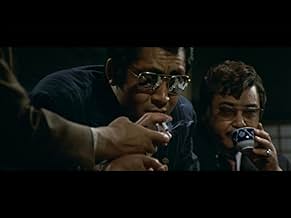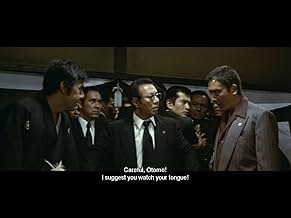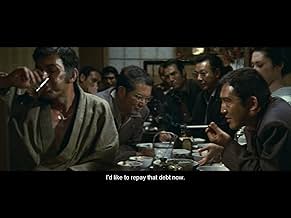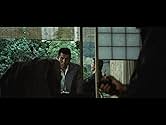IMDb-BEWERTUNG
7,3/10
1339
IHRE BEWERTUNG
Füge eine Handlung in deiner Sprache hinzuWhile Hirono is in prison, his rival Takeda turns his own crime organization into a political party, whose two executives stir up new tensions in their thirst for power.While Hirono is in prison, his rival Takeda turns his own crime organization into a political party, whose two executives stir up new tensions in their thirst for power.While Hirono is in prison, his rival Takeda turns his own crime organization into a political party, whose two executives stir up new tensions in their thirst for power.
- Regie
- Drehbuch
- Hauptbesetzung
Jô Shishido
- Katsutoshi Otomo
- (as Joe Shishido)
Empfohlene Bewertungen
I finished the whole jingi series in 2 day and I'm rewatching the first movie and if I were to summarize this film it was basically an relativly peaceful ending to a man who lived in loyalty at the start and slowly started to get involved in a yakuza war with betral and a big physiological warfare.
Overall I absolutely loved this series and planning to watch more yakuza film and I would recommend it to anyone's who's interested.
Overall I absolutely loved this series and planning to watch more yakuza film and I would recommend it to anyone's who's interested.
FINAL EPISODE is, unsurprisingly, the last of Kinji Fukasaku's five-part yakuza film series that began with BATTLES WITHOUT HONOR AND HUMANITY years previously. This handles a more political storyline, lighter on the action and heavier on the talk, that nonetheless brings the story virtually up to date and continues to enchant with its depiction of a lawless world of honour, reputation, and death.
As with the other films in this series, FINAL EPISODE has plenty of energy to keep it moving through the slower spots. The yakuza may be older and more grizzled in this film, but they're none the wiser, and the low level thugs are still committing carnage on the streets. Bunta Sugawara's Hirono is finally released from prison and discovers a world very different from the one he knew previously. The production values remain high and the excellent soundtrack continues to complement the on-screen action perfectly.
As with the other films in this series, FINAL EPISODE has plenty of energy to keep it moving through the slower spots. The yakuza may be older and more grizzled in this film, but they're none the wiser, and the low level thugs are still committing carnage on the streets. Bunta Sugawara's Hirono is finally released from prison and discovers a world very different from the one he knew previously. The production values remain high and the excellent soundtrack continues to complement the on-screen action perfectly.
I would have said "awful" but the other films were so great! It was such a disappointment after watching the others. At the end of the film there were too many loose ends, so much left behind unresolved with no closure for the main character or more importantly, the viewer. At this point in the series, I was having problems as well with everyone's inability to hold a gun straight. And why were they always falling down on the people they shot?
All I can say is that if this is based on the memoirs of a Yakuza boss, and these films held true to story... only then can I accept this "real" ending. Otherwise what a let down. Maybe I'm just sad it's over.
All I can say is that if this is based on the memoirs of a Yakuza boss, and these films held true to story... only then can I accept this "real" ending. Otherwise what a let down. Maybe I'm just sad it's over.
Despite Police Tactics ending on a high note, I guess Toei thought there was still more to tell with this story and mandated that we get a definitive ending with nothing left unresolved. The fittingly titled Final Episode maintains the series' exceptional quality, one that doesn't feel tacked on in the slightest, easily the talkiest of the series and burdened with the task of wrapping up dozens of loose threads, it's a testament to Kinji Fukasaku's incredible talent that he and his crew were even able to fashion a film out of so little material and on such a tight schedule. Though the incidence hasn't been perfect all along, five pictures deep, the trajectory of the ongoing narrative mirrors, at the first and the last, how the instalments are approached in terms of both film-making and storytelling style. The progenitor explored the violence of the yakuza in the early post-war years as Japan rebuilt, and it's quite fitting that as both written and executed it would bear wild, chaotic energy that was a veritable shot in the arm for the genre. Granted the pacing of this one is filled with stops and starts due to the loose structure of its script and the big players are mostly kept to the sidelines for the majority of the runtime; I'll be damned that it follows in the same vein as Deadly Fight in Hiroshima thanks to some exceptional performances from its cast, all of whom deliver fantastic performances. As compelling for its performances as for its historical detail, Final Episode keeps the energy level high, its technical aspects strong and its cast thoroughly engaging right up until the last body falls and the Battles finally end, one age of the yakuza fades to be replaced by another.
With the authorities cracking down on organized crime, many yakuza families prolonged their existences by becoming political parties. The cops weren't fooled, but it did make it harder to prosecute them.
The talkiest of the entries and the entry burdened with the task of wrapping up dozens of loose threads, FINAL EPISODE depicts the legitimization of the crime and protection business and draws a curtain on the life of Bunta Sugawara's symbolic yakuza "torpedo".
It is as compelling for its performances as for its historical detail. Right up until the last body falls, director Fukasaku keeps the energy level high and kicks the narrative along at a heady pace.
It has been a monumental journey and a classic, unforgettable piece of cinema.
The talkiest of the entries and the entry burdened with the task of wrapping up dozens of loose threads, FINAL EPISODE depicts the legitimization of the crime and protection business and draws a curtain on the life of Bunta Sugawara's symbolic yakuza "torpedo".
It is as compelling for its performances as for its historical detail. Right up until the last body falls, director Fukasaku keeps the energy level high and kicks the narrative along at a heady pace.
It has been a monumental journey and a classic, unforgettable piece of cinema.
Wusstest du schon
- WissenswertesIn one of the final scenes, several yakuza members approach a theatre playing Onna Toseinin, aka Onna toseinin (1971) and ogle the poster featuring Sumiko Fuji as the latter movie's theme music plays. Onna Toseinin is a "ninkyo eiga" or "chivalry film" in which yakuza are portrayed in a romanticized way as honorable, upstanding citizens, or cool, wandering gamblers. This is certainly meant as a strong contrast to the "jitsuroku eiga" / "actual record film", or true crime style of this Battles Without Honour and Humanity series, in which modern yakuza are more accurately portrayed as brutally destructive, craven goons engaging in chaotic violence and murder. Ironically, Yumiko Nogawa who appears in this film as a yakuza wife, 12 years earlier appeared in an early ninkyo eiga series of her own as a similar wandering woman gambler character, Toba no mesu neko (1965).
- VerbindungenFeatured in Game One: Rage, Might & Magic: Heroes 6 (2011)
Top-Auswahl
Melde dich zum Bewerten an und greife auf die Watchlist für personalisierte Empfehlungen zu.
Details
- Laufzeit
- 1 Std. 40 Min.(100 min)
- Sound-Mix
- Seitenverhältnis
- 2.35 : 1
Zu dieser Seite beitragen
Bearbeitung vorschlagen oder fehlenden Inhalt hinzufügen
















